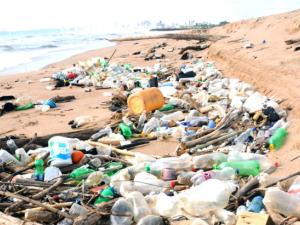South Africa's beach invasion.
Cape Town - The beautiful “16 Mile Beach” in the West Coast National Park may look near pristine to the casual observer, but researchers have found more than one thousand pieces of plastic collectively weighing just over 1kg in every metre of this beach.
 Most of these pieces are micro-sized – just a few millimetres or even smaller – and are the real environmental problem because they are consumed by marine organisms, biologist Peter Ryan told the opening session of the African Marine Debris summit that was held at the SA National Biodiversity Institute at Kirstenbosch.
Most of these pieces are micro-sized – just a few millimetres or even smaller – and are the real environmental problem because they are consumed by marine organisms, biologist Peter Ryan told the opening session of the African Marine Debris summit that was held at the SA National Biodiversity Institute at Kirstenbosch.
Ryan, a professor in the FitzPatrick Institute of African Ornithology who started researching the problem of marine and coastal plastic pollution during the 1980s, also said the researchers had found that more than 90 percent of litter on Milnerton Beach near the Rietvlei estuary consisted of plastic items, and that between 1994 and 2012 plastic pollution here had risen over threefold.
On the beach at the protected Koeberg Nature Reserve it had also increased threefold during this same period. “I’m afraid we’re not winning this one,” he said.
Ryan pointed out that global production of plastic had been 260 million tons five years ago and was now probably closer to 300 million tons, accounting for about eight percent of global oil production.
Although plastic products were “wonderful” when used and disposed of appropriately, there was also a “dark side”, he said.
Even at a place like the aptly named Inaccessible Island in the Tristan da Cunha group, which was 3 000km from any production facility, the beaches were covered in plastic debris.
Divers had even found plastic items on the ocean bed beneath the Arctic ice cap.
“You cannot go anywhere on the planet these days and not find plastic”.
Plastics typically made up between 80 and 95 percent of beach litter by number and between 60 and 90 percent by mass, Ryan said.
Cleaning up plastic pollution was just treating the symptoms, he said.
“We really need to tackle the causes, and we’ve been saying this for 20 years.”
Pointing out that the volume of plastic shopping bags used had dropped “by an order of magnitude” after a charge had been levied on them, he said he was “a big fan” of incentives like charging for plastic items so that people had a choice.
 Most of these pieces are micro-sized – just a few millimetres or even smaller – and are the real environmental problem because they are consumed by marine organisms, biologist Peter Ryan told the opening session of the African Marine Debris summit that was held at the SA National Biodiversity Institute at Kirstenbosch.
Most of these pieces are micro-sized – just a few millimetres or even smaller – and are the real environmental problem because they are consumed by marine organisms, biologist Peter Ryan told the opening session of the African Marine Debris summit that was held at the SA National Biodiversity Institute at Kirstenbosch. Ryan, a professor in the FitzPatrick Institute of African Ornithology who started researching the problem of marine and coastal plastic pollution during the 1980s, also said the researchers had found that more than 90 percent of litter on Milnerton Beach near the Rietvlei estuary consisted of plastic items, and that between 1994 and 2012 plastic pollution here had risen over threefold.
On the beach at the protected Koeberg Nature Reserve it had also increased threefold during this same period. “I’m afraid we’re not winning this one,” he said.
Ryan pointed out that global production of plastic had been 260 million tons five years ago and was now probably closer to 300 million tons, accounting for about eight percent of global oil production.
Although plastic products were “wonderful” when used and disposed of appropriately, there was also a “dark side”, he said.
Even at a place like the aptly named Inaccessible Island in the Tristan da Cunha group, which was 3 000km from any production facility, the beaches were covered in plastic debris.
Divers had even found plastic items on the ocean bed beneath the Arctic ice cap.
“You cannot go anywhere on the planet these days and not find plastic”.
Plastics typically made up between 80 and 95 percent of beach litter by number and between 60 and 90 percent by mass, Ryan said.
Cleaning up plastic pollution was just treating the symptoms, he said.
“We really need to tackle the causes, and we’ve been saying this for 20 years.”
Pointing out that the volume of plastic shopping bags used had dropped “by an order of magnitude” after a charge had been levied on them, he said he was “a big fan” of incentives like charging for plastic items so that people had a choice.
You can return to the main Market News page, or press the Back button on your browser.

